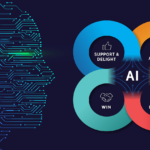AI and Data Privacy: Balancing AI advancements with privacy concerns and techniques for privacy-preserving AI.
Privacy Challenges in AI: AI often relies on vast amounts of data, including personal and sensitive information. The collection, storage, and processing of such data raise concerns about privacy breaches, data misuse, and the potential for discriminatory outcomes. Ensuring privacy protection becomes crucial to maintain trust and ethical AI practices.
Privacy by Design: Privacy should be considered from the early stages of AI system development. Privacy by Design principles involve incorporating privacy safeguards into the design and architecture of AI systems. This includes practices like data minimization, purpose limitation, and user consent mechanisms to ensure that privacy is prioritized throughout the AI lifecycle. Differential Privacy: Differential privacy is a technique used to protect individuals’ privacy while analyzing data. It involves adding noise or perturbation to the data to prevent re-identification of individuals. By guaranteeing a certain level of privacy, differential privacy enables AI systems to provide meaningful insights without compromising individual privacy.
Federated Learning: Federated learning is an approach that allows AI models to be trained on decentralized data sources while keeping the data locally. Instead of centralizing data in a single location, federated learning allows the training process to take place on individual devices or servers, preserving data privacy. Only aggregated model updates are shared, minimizing exposure of raw data. Secure Multiparty Computation: Secure multiparty computation (MPC) enables collaboration on data analysis without revealing the underlying data to any party.
MPC protocols allow multiple entities to jointly compute results while keeping their data private. This technique can be applied in scenarios where multiple parties need to collaborate while maintaining data privacy. Homomorphic Encryption: Homomorphic encryption allows computation on encrypted data without decrypting it. It enables AI algorithms to operate on encrypted data, protecting the privacy of sensitive information during processing. Homomorphic encryption allows for secure data analysis and inference while preserving confidentiality.
Privacy-Preserving Machine Learning: Various privacy-preserving machine learning techniques have been developed, such as secure aggregation, secure model training, and encrypted machine learning. These methods aim to protect sensitive data during the training and inference phases, allowing organizations to leverage AI while maintaining privacy.
Regulatory Frameworks: Governments and regulatory bodies are increasingly recognizing the importance of data privacy in the context of AI. Regulations like the General Data Protection Regulation (GDPR) in the European Union and the California Consumer Privacy Act (CCPA) in the United States impose requirements on data handling and give individuals more control over their personal information. Balancing AI advancements with data privacy requires a combination of technical measures, regulatory frameworks, and ethical considerations. It is important to develop AI systems that respect privacy, provide transparency, and empower individuals to make informed choices about their data.


































